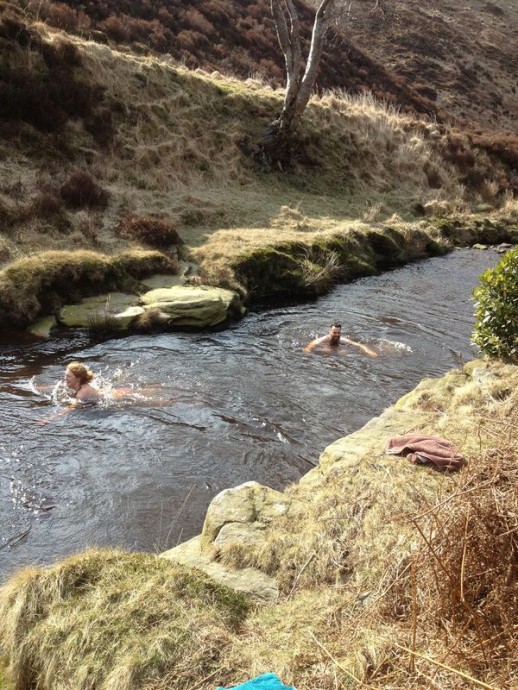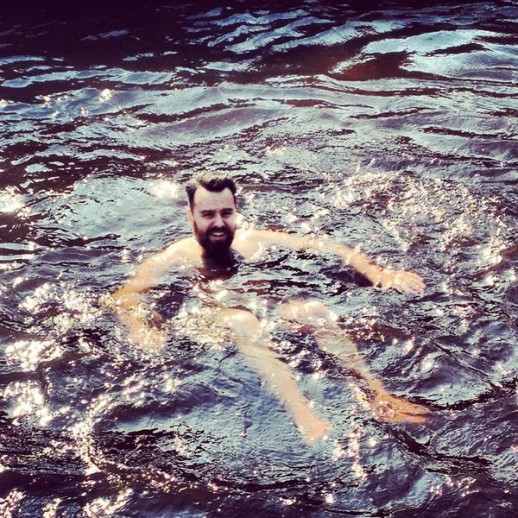Words by Ben Myers. Pictures by Adelle Stripe.
Three weeks ago it was snow. Great drifts of it, blowing across the moors and banking up against the dry-stone walls until they disappeared. This stretch of the Pennines was buried and even now, with the sun shining and the overdue daffodils fighting for their section of sky, my road is still closed due to subsidence caused by the weight of the snow and the shifting of rock and mud up top cracking stone work that is decades – maybe centuries – old.
Today the moorlands wear a different mask though. The sun is out and a warm westerly whistles through the burgeoning grasses. The snow has found a new purpose.
I’d been sporadically swimming outdoors before I read Roger Deakin’s Waterlog back in 2007, but not with the greater sense of mischievous, anti-authoritarian purpose – what Jeff Barrett has dubbed “pastoral anarchy” – that came afterwards. Since then I’ve been in reservoirs in Kent, remote rivers in the Dales, deep dark pools in the Lake District, the choppy North Sea and a variety of obscure streams, waterfalls and holes around my home in Calderdale, West Yorkshire. I’m reluctant to use the word ‘wild’. To me it’s just swimming, but without kids dive-bombing you, veruca plasters floating into your mouth or those old NO HEAVY PETTING signs on the walls. Wild suggests savagery, when really outdoor swimming is tranquil and restorative.
And every time I lend a copy of Waterlog to someone there is a new convert. Because Waterlog is the only contemporary book that I can say with some degree of confidence will be read in one hundred years time. But if you’re here you probably already know that.
We pick our way out of town and up the valley. There are three of us: two to egg each other on, and one to hold the oatcakes. A dog to run for help when it all goes wrong. The sun is out, the sweat on our backs. We pass a reservoir. We pass another reservoir. The black waters are foreboding, reservoirs always intensely atmospheric due to their strange combination of staggering feats of engineering and the grim potential of the unseen and unknown. I’ve been working on a novel that features a reservoir as a backdrop. I think about these things a lot. Reservoirs always feature in sad summer news stories.
We crest the valley and enter another one. We follow a narrowing tributary uphill until it becomes a small musical stream that disappears off into an unexpected Rhododendron patch, and whose rusted peat waters give the effect that it is copper-bottomed. Every time I come across such a small swimmable stream or river, I think of Richard Brautigan’s short story The Cleveland Wrecking Yard, in which the narrator hears of a used trout stream, salvaged from Colorado and for sale in a wrecking yard for “Six dollars and fifty-cents a foot” (with birds “thirty-five cents apiece”). Brautigan’s underlying message is: America’s great wilds and natural resources are being carved up and sold off, but I just like the absurdist idea of being able to select a length of trout stream “stacked in piles of various lengths: ten, fifteen, twenty feet, etc. There was one pile of hundred-foot lengths. There was also a box of scraps. The scraps were in odd sizes ranging from six inches to a couple of feet.”
There can be no pre-amble or toe-dipping. We’re straight in for that torturous first ten seconds. I think of Jesus having nails being driven through his feet. The stream stones are slick with algae and smoothed by the flow of many a millennia. The dog looks at me quizzically. You just have to let yourself go. Trust the water to take you. The snowmelt tightens everything. Skin, landscape, all the senses. My thoughts. I climb out on unsteady legs. Take a breath. Get back in again. Swim. Climb out. Get back in again.
And then it stops being cold. The warm rush of blood takes over and a long winter – seven months of rain and darkness after a previous summer of floods – falls away. The cobwebs are gone. Spring’s seal is broken.
Ben Myers is a contributor to Words on Water and a sometime writer for Caught by the River. His most recent novel Pig Iron is out now on Bluemoose.

